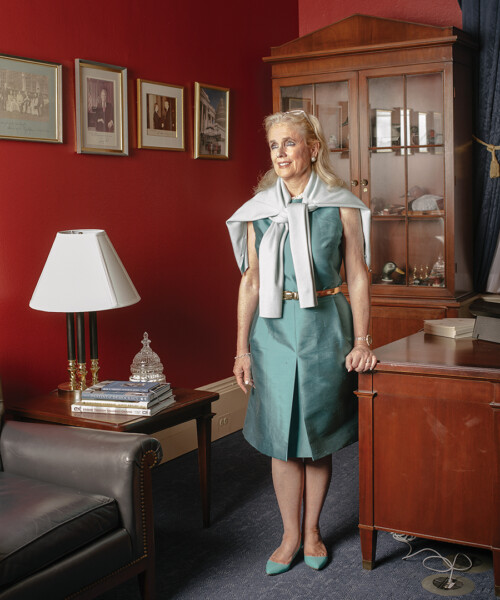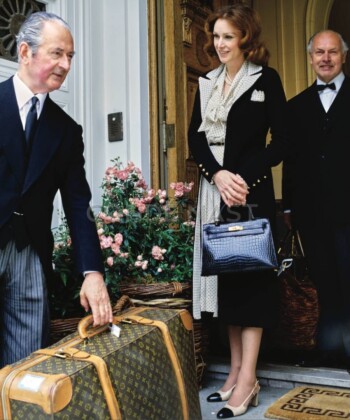Debbie Dingell is less than a year into her freshman term as the congresswoman for Michigan’s 12th district, but it’s a job for which she has spent nearly her entire life preparing.
A onetime General Motors executive, Dingell—who drives a red Cadillac—has been married for more than three decades to former Representative John Dingell, a 59-year veteran of Capitol Hill who was of the most powerful and revered members of Congress. After her husband retired, Dingell handily won his seat representing the working-class, heavily Democratic district. During her long apprenticeship, she saw partisanship rise and friendships fray, and now she’s running hard to make her mark as someone who can work across the aisle and fix a broken system.
Sitting on the brown, government-issued couch in her office in the Cannon House Building, the 61-year-old Dingell sports a white dress and white heels, her blonde hair pulled back in a ponytail. She takes occasional swigs from a bottle of Diet Coke as we talk. It’s 11 in the morning. “I’m a car girl,” she exclaims when I notice two models on a nearby table. “I’m proud to be a car girl. I didn’t used to be able to say it because people constantly were trying to use it against John.”
But Congress has changed, and though Dingell comes to the House with a portfolio of her own accomplishments and connections, she’s still got a lot to prove. The issues Dingell is prioritizing relate to aging, women’s health and domestic violence. Her first bill in Congress would have Medicare cover hearing aids, and her second, introduced in July and co-sponsored with Illinois Republican Robert Dold, aims to close the so-called “boyfriend loophole” that allows convicted abusers to obtain guns. “John probably wishes I wasn’t making this my issue,” Dingell confesses. After all, her husband is a hunter and a sportsman, and a former board member of the National Rifle Association. But Dingell comes at the subject from a different perspective, having grown up with a father who threatened the family with a firearm. She never spoke of it publicly until the Sandy Hook massacre prompted her to publish an op-ed in the Washington Post, which described the “raw terror” she and her siblings felt around their father. It was a bold move, but made clear that Dingell put more stock in principles than she did in politics.
Dingell is perpetually in motion. She’s always thinking about what she did last or what she will do next, and it’s hard to come up with a good cause she hasn’t embraced or raised money for. “Debbie does a lot of good and she works her ass off,” says Washington lawyer Paul Equale, a friend of hers. “She’s not happy unless she’s making a difference.” That seems to be true in and out of the public eye.
After former Speaker of the House Nancy Pelosi tangled with John Dingell in 2008, resulting in his ouster from the House Energy and Commerce Committee, there were some bruised feelings. And when Debbie Dingell came to Congress, “people wanted to pit me and Nancy Pelosi against each other,” she says. That wasn’t going to fly. At an event for the Democratic Congressional Campaign Committee, Dingell and Pelosi did their best to dispel any leftover ill will. “We both got up and talked about women supporting each other,” Dingell says. “Nancy mentored me when I came in, but I’m tired of mean girls. Even at my age, it still happens and they still can make you cry.”
She won’t name names, but it’s clear Dingell has strong feelings about the feminist revolution she has lived through and benefited from. “Everybody always wondered what I wanted,” she says, reflecting on her career in the auto industry, “and I really envisioned myself being a senior executive at General Motors.” But that aspiration wasn’t easy, even for the granddaughter of one of the company’s founders. “When I went for a job interview, I was asked, ‘Why would a woman want to work at GM?’ In those early years, I experienced discrimination in many ways. I believe in women supporting women, but I am where I am because men supported me too. Too often women think if another woman succeeds, it hurts them. And that’s just wrong.”
Despite what she calls “serious” sexual harassment from a supervisor in the 1970s—“It was awful,” she says, “and when I asked for help, I was told to put up with it or leave”—Dingell stuck with GM, becoming a senior executive responsible for public affairs, and later, president of the General Motors Foundation. The jobs made her one of the most plugged-in and sought-after people in Washington, but they didn’t turn her into a partisan.
When the Clintons came to the White House and party lines became trenches, Dingell partnered with Marlene Malek, the wife of a prominent Republican, to host a “girlfriends” lunch. Now an annual affair, the guest list has grown from 40 people to nearly 600. “One of my rules is I don’t drop people,” Dingell says. “The thing I hate about this town is when you’re in, you’re in—and the minute you’re out, you’re out. In my world, if you’re my friend, you’re my friend. It’s not based on what job you have.”
After Republican Scott Brown lost his senate seat to Elizabeth Warren in 2012, Brown’s wife didn’t think she was invited anymore; she stayed on the list.
Another Dingell rule: Tell it like it is. “I can’t stand political speak,” she says. On Facebook, she does her own posting. “I tell people if they want to get the roads fixed, they need to tell their legislators to get some balls,” she says. Does this give her staff heartburn? “Decidedly.”
Despite whatever waves it might create, Dingell prides herself on being blunt—she’s up front about her opinions, her motives and what she wants for the constituents in her district. “The American people,” she says, “are tired of people talking out of both sides of their mouths.”








































